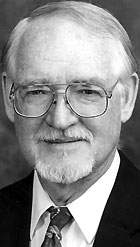The following was written by Frank K. Flinn, Ph.D., adjunct professor of religious studies in Arts & Sciences. Flinn is author of The Encyclopedia of Catholicism (2007) and has frequently appeared as an expert in court cases involving church and state issues.

In November, citizens in the State of California passed Proposition 8 upholding the idea that marriage is defined as and limited to the union of one man with one woman. This vote has given encouragement to many in other states who want to pass similar legislation. The United States is about to enter upon a period of legal upheaval on the question of marriage in the civil law. Our problem is that we as a nation have failed to distinguish clearly between marriage and civil unions.
There is a simple solution to our problem. The churches are clamoring for the right to rule over the meaning and conditions of marriage. I recommend that we give marriage to them. Marriage then belongs to the realm of theology. This situation necessitates that the state completely withdraw from defining and legislating what marriage means and leaves that task to religion. Conversely, religion must also withdraw from telling the state what is a civil union.
The state’s primary interest is in how people live together in peace and harmony. Provided that the contracts among individuals conform to general law, the state has no other interest than in maintaining the terms of the contract. People can form corporations, cooperatives or collectives, joint living arrangements, or any other kind of social grouping. What they need from the civil authority is a license that commits them to the terms of the contract. If some people then want to get “married” in the religious sense, they are free to do so extra-legally according to their particular religious tradition’s definition of marriage.
The civil state is not the arbiter of theological conflicts. As Justice Douglas said so eloquently in U.S. v. Ballard (1944), “Heresy trials are foreign to our Constitution.” That the definition of marriage as a union between one man and one woman is a theological claim, and has always been a theological claim, is clearly demonstrated by the fact that polygamy has been approved in other religious traditions for millennia, such as Islam, African traditional religion, and South American tribal religion. Religious groups asking the state to determine the definition of marriage are inviting the state to settle theological disputes, that is, to conduct heresy trials.
The U.S. Constitution says absolutely nothing about marriage or the definition of marriage. However, marriage sneaked into the backdoor as a constitutional issue through the notorious case of Reynolds v. U. S. (1878). Basing itself on a U.S. Territorial Statute (Revised Statutes 5352) outlawing bigamy, the court stated that the Mormon polygamist George Reynolds could not use the defense of religious duty in warding off charges of bigamy. Reynolds implicitly defined marriage as the union of one man and one woman.
I believe that Reynolds v. U.S. was wrongly decided. First, marriage is simply not a Constitutional matter. Second, certain religious segments of the U.S. population have monopolized the term “marriage” and have endowed it with a restrictive theological bias. As a result marriage is no longer a concept defining a civil institution but a theological status being fought over not only between religions but also between denominations within religions. Third, the state’s interest is solely in lawfulness along with civil harmony and stability. The internal form of civil unions is beyond the interest or the competence of the state, most especially when disputes about the nature and conditions of “marriage” entangle the state in settling theological arguments. The state’s function is simply to insure that civil unions outwardly conform to the rule of law.
The political executive branch in the United States is not a pope with his curia. Legislatures are not church synods or councils. Courts are not ecclesiastical rotas. Judges are not the arbiters of what is valid or invalid before God, nor are they arbiters of what is legal or illegal before the Supreme Being. They are arbiters of what is lawful before the Constitution. The U.S. Constitution is not unalterable sacred scripture but a code of law handed on to us not by prophets or divinely-inspired lawgivers but by our Founding Fathers who foresaw that the law might need amendment from time to time.
My solution is simple: churches, synagogues, mosques, etc., are free to arbitrate “marriage” for their respective denominations, including monogamy, polygamy or same-sex marriage. This arbitration however is beyond the realm of the legal. Marriages are the business of the church; civil unions are the business of the state. The law should become blind to the theologically laden term “marriage.”